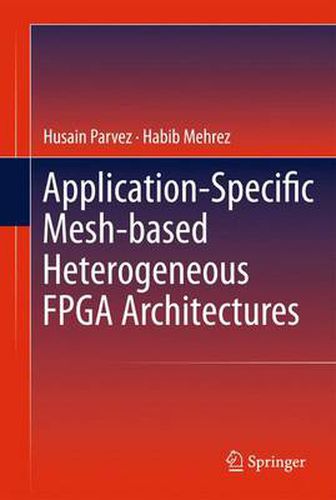Readings Newsletter
Become a Readings Member to make your shopping experience even easier.
Sign in or sign up for free!
You’re not far away from qualifying for FREE standard shipping within Australia
You’ve qualified for FREE standard shipping within Australia
The cart is loading…






This title is printed to order. This book may have been self-published. If so, we cannot guarantee the quality of the content. In the main most books will have gone through the editing process however some may not. We therefore suggest that you be aware of this before ordering this book. If in doubt check either the author or publisher’s details as we are unable to accept any returns unless they are faulty. Please contact us if you have any questions.
This book presents a new exploration environment for mesh-based, heterogeneous FPGA architectures. It describes state-of-the-art techniques for reducing area requirements in FPGA architectures, which also increase performance and enable reduction in power required. Coverage focuses on reduction of FPGA area by introducing heterogeneous hard-blocks (such as multipliers, adders etc) in FPGAs, and by designing application specific FPGAs. Automatic FPGA layout generation techniques are employed to decrease non-recurring engineering (NRE) costs and time-to-market of application-specific, heterogeneous FPGA architectures.
$9.00 standard shipping within Australia
FREE standard shipping within Australia for orders over $100.00
Express & International shipping calculated at checkout
This title is printed to order. This book may have been self-published. If so, we cannot guarantee the quality of the content. In the main most books will have gone through the editing process however some may not. We therefore suggest that you be aware of this before ordering this book. If in doubt check either the author or publisher’s details as we are unable to accept any returns unless they are faulty. Please contact us if you have any questions.
This book presents a new exploration environment for mesh-based, heterogeneous FPGA architectures. It describes state-of-the-art techniques for reducing area requirements in FPGA architectures, which also increase performance and enable reduction in power required. Coverage focuses on reduction of FPGA area by introducing heterogeneous hard-blocks (such as multipliers, adders etc) in FPGAs, and by designing application specific FPGAs. Automatic FPGA layout generation techniques are employed to decrease non-recurring engineering (NRE) costs and time-to-market of application-specific, heterogeneous FPGA architectures.